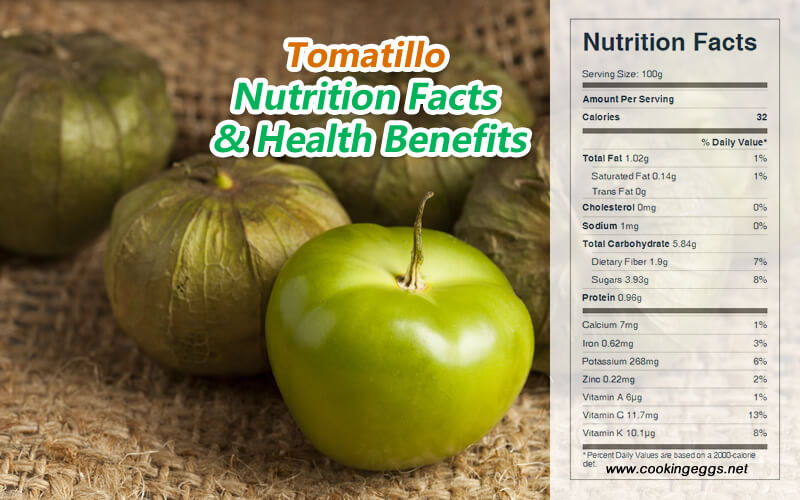Tomatillo Nutrition Facts and Health Benefits
Tomatillos originated in Mexico and are also known as the Mexican husk tomato. Like the tomato, they belong to the nightshade family and are actually a fruit. They have a tangy lemony flavor.
Nutritional Value of Tomatillo
Tomatillo contains 91% water, 5.8% carbohydrates, less than 1% protein and fat, vitamin C, vitamin K, dietary fiber, potassium, and magnesium.
Fresh tomatillo contains 32 calories, 1.02 g protein, 1.02 g fat, 5.84 g carbohydrates, 1.9 g dietary fiber, 440 g thiamin, 0.035 mg riboflavin, 1.85 mg niacin, 0.15 mg pantothenic acid, 0.056 mg vitamin B6, 7 g total folate, 0.38 mg α-tocopherol, and 10.1 g phylloquinone per 100 gram reference.

Tomatillo Nutrition Facts Label
Health Benefits of Tomatillo
Tomatillos are low in calories and low-fat fruit vegetables with high fiber content, which is the best diet for diabetics and dieters.
Tomatillo fruits contain vitamins, minerals, phenolic compounds, and antimicrobial and antinarcotic steroidal lactones such as physalins. This is why plants and fruits are widely used in traditional medicine to relieve some discomforts like fever, cough, amygdalitis, gastrointestinal disorders, or diabetes.
Tomatillos are a good source of vitamin C. It consists of 11.7 mg of vitamin C, which is 13% of the daily value. Vitamin C is a powerful water-soluble antioxidant and is an essential nutrient involved in the repair of tissue, the formation of collagen, and the enzymatic production of certain neurotransmitters. It helps scavenge harmful, pro-inflammatory free radicals by virtue of its antioxidant properties. Vitamin-C also boosts immunity to fight against flu infections.
Tomatillos have a high pectin content and dietary fiber. Pectin is a soluble dietary fiber. Pectin binds to cholesterol in the gastrointestinal tract and slows glucose absorption by trapping carbohydrates. Consumption of pectin has been shown to slightly reduce blood LDL cholesterol levels. Pectin increases the viscosity and volume of stool so that it is used against constipation and diarrhea.
Tomatillos consist of a considerable amount of potassium, which is extremely beneficial for healthy blood pressure levels. Potassium acts as a vasodilator, which means it helps to relax blood vessels, reduces the strain on the cardiovascular system, and encourages circulation and oxygenation to vital parts of the body. Potassium ions are vital for the functioning of all living cells. Studies show that foods rich in potassium help lower blood pressure and reduce the risk of stroke and cardiovascular disease. Diets low in potassium can lead to hypertension and hypokalemia.